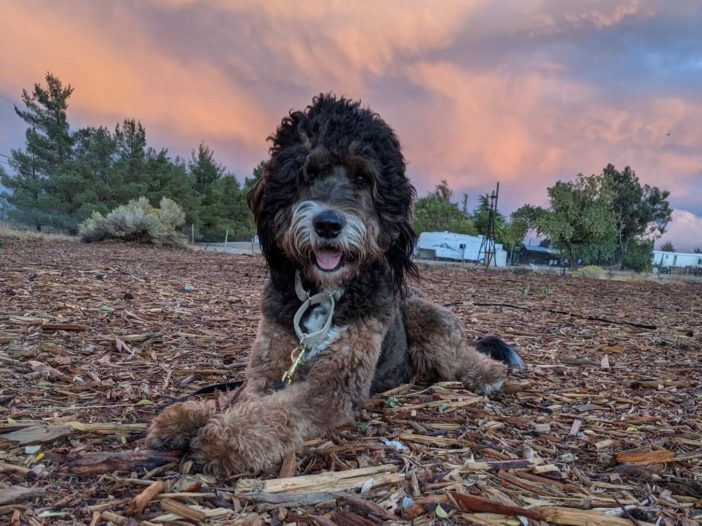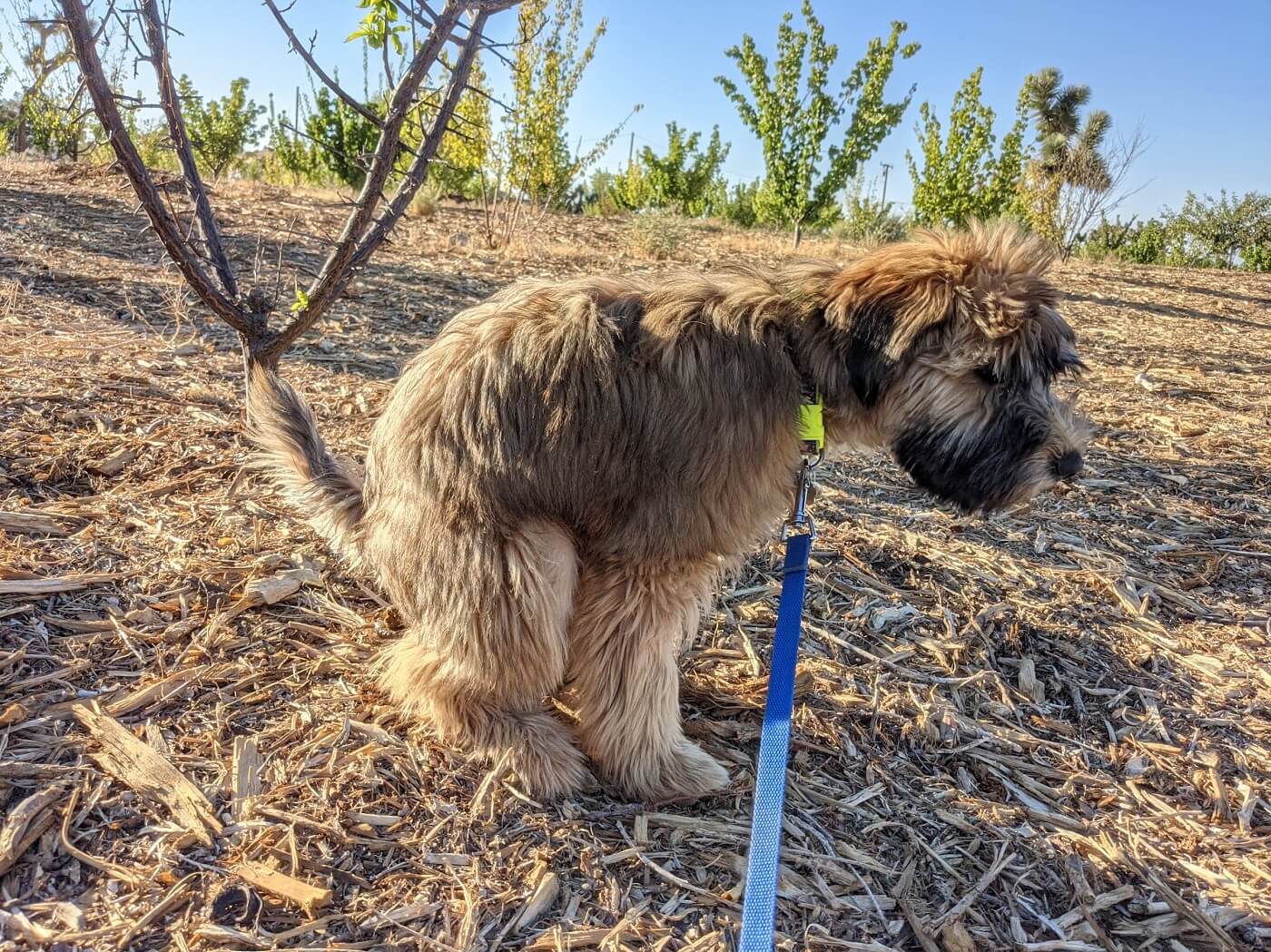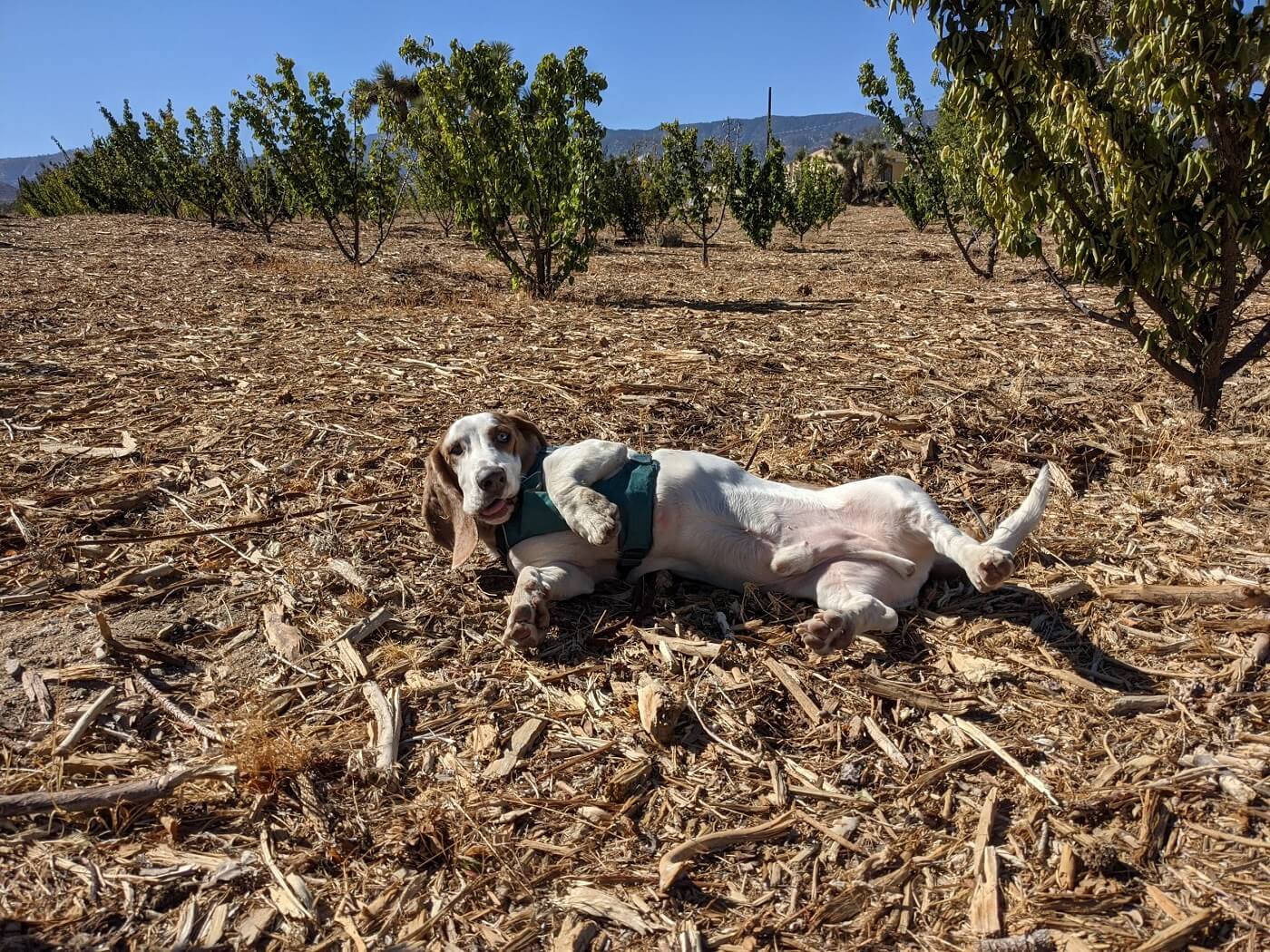
Poop Eating – Coprophagia
This is going to be a crappy post about a smelly behavior most parents don’t like to discuss — a dog’s secret obsession with eating poop.
Many dogs are poop connoisseurs and in fact, will eat not just their own poop but other species’ poop. (Yumm)
To clarify, for the purpose of this article, I will focus on dogs eating the poop of any species (interspecific coprophagia.) However, there are many subdivisions and labels for poop-eating dogs such as, dogs that solely eat their OWN poop (autocoprophagia), or a dog that eats OTHER dogs’ poop (intraspecific coprophagia/ allocoprophagia).
TL;DR
- Dog’s eating dog poop (cat poop and other species’ poop) is natural.
- It’s part of a dog’s genetics. Dogs are omnivores that scavenge, forage, and love carrion smells/tastes such as vile, pungent odors and stuff to play with and eat. Dogs eat lots of things with zero nutritional value for fun or because it seems interesting to them.
- There is no conclusive evidence that points to any single reason why dogs eat poop.
- The most effective way to get your dog to stop eating poop is management. However, there are many other methods and factors to consider that may help with dog poop eating such as dog training, behavior modification, enrichment, exercise, and nutrition.
Why Do Dogs Eat Poop?
It is shown that approximately 50% of dogs eat poop at some point. Poop eating is so common that parents will often request our Dog Boot Camp Los Angeles service to help train their dog to stop eating poop.
Some dogs love eating cat poop while other dogs, who wouldn’t dare eat their own poop, feast on their sibling’s or friend’s poop.
When you search for “why do dogs eat their own poop” or “why do dogs eat cat poop”, you’ll find loads of poop-eating dog research for dogs and all animals. However canine poop-eating is believed to stem from domestication, survival, and atavistic qualities.
Although dogs are not pack animals, wolves, alpha/trying to dominate you, den-animals or carnivores some of a dog’s behaviors such as poop eating is attributed to atavistic qualities that carried over from their evolution of Canis Lupus. (more precisely, an extinct population of the grey wolf, Pleistocene wolf)
Coprophagia (poop-eating) is part of the canine ethogram.
It seems odd that part of a dog’s natural behavior involves eating feces (just like why do dogs lick you) but research shows it may have benefited wild dogs and/or community dogs by keeping the nesting/whelping box clean to avoid detection by predators and/or to keep puppies clean and healthy.
However, in today’s society as domesticated house pets, poop eating is not a useful behavior for Canis lupus familiaris.
We classify canines as carrion-eating (opportunistic) omnivores. As such, many things a dog does “in nature” aren’t nutritional, or beneficial from an ethological, behavioral or evolutionary standpoint. In fact, many things a dog chooses to do could injure or kill a dog.
As carrion animals, dogs are scavengers and foragers that previously survived by eating decaying, vile carcasses and scavenging through garbage, eating many smelly things off the ground. Thus, today, we can surmise that if an item seems interesting to a dog they will explore it with their nose and mouth and/or eat/taste it.
Dogs are not alone. Many species continue to perform behaviors that are not healthy and/or may hurt their chances of survival. These behaviors persist for unknown reasons.
In the seminal article, Misbehavior Of Organisms, by Keller and Marian Breland, the authors describe idiopathic behaviors of dogs and atavistic behaviors that Certified Animal Behaviorists don’t understand.
As mentioned, one common reason dogs eat poop is that poop-eating is a naturally evolved behavior. But first, I want to clarify what “natural” means in this context.
With regards to poop-eating dogs, “natural” means behaviors that a dog will perform without any intervention from a person (or otherwise). It can be learned, genetic, or a combination of both.
Behaviors like a dog barking, jumping, and humping/mounting, are all self-reinforcing, rewarding intrinsic behaviors, similar to coprophagia. Dog poop eating is a behavior that is intrinsically reinforced because it may feel, smell and/or taste good to a dog, is genetically hardwired and therefore difficult/impossible to stop completely without management.
“Natural” does not mean healthy or behaviors performed for survival or for other reasons. But left to their own autonomy and decision-making abilities, many dogs would dine on fine stools everywhere.
Clearly, just because a behavior is natural doesn’t mean we want to reinforce, condone or prefer a dog to eat poop.
Some dog behaviors we don’t allow because of health or ethical reasons. Other dog behaviors we find repugnant– like poop eating–though it wouldn’t necessarily harm a dog.
For the record, besides poop eating, dogs perform many behaviors that may be natural that we don’t find nice or approve of such as:
– Incest. Yup, your dog would hump a sibling or parent. No shame.
– Eat deadly chemicals such as brake fluid
– Kill or injure another dog, cat, animal or person
– Bite, bark, pee and poop wherever they want
– Impregnating and abandoning their family (Males don’t help with the rearing of the litter)
– Eating the placenta in the whelping box
– Cannibalism
– Killing each other, etc.
As you can see, poop-eating isn’t the only ”natural” behavior we don’t want dogs to do.
Other Potential (But Not Proven) Causes Of Coprophasia
We covered above why does my dog eat poop. However, there are also many research papers and case studies, some extreme and abusive and others anecdotal that suggest (not prove) why dogs eat poop.
Coprophagia is hypothesized but not proven to be caused by many influences that may contribute to why a dog eats poop such as:
- Under enrichment – a dog must be fully enriched every day. If a dog gets bored they might start exploring eating poop because there is nothing more interesting to do in the environment.
- Boredom – if your dog doesn’t get the attention they want from you and they learn that you give them 100% of your attention and energy when they eat poop, they may associate eating poop with mom/dad paying attention to them (negative or positive). Just like barking, jumping and other behaviors, we might not like or approve of, attention is attention. It doesn’t matter that you are upset and yelling at your dog, it’s still attention. Ask any kid, negative attention is better than no attention at all. Dogs are no different.
- Underexercised – as with boredom and under-enriched mentioned above, if your dog is not adequately exercised, this could also lead a dog to look for cowpies or dog dung to play with.
- Learned behavior – social learning plays a large role in how dogs learn and navigate the world. a dog may have learned this from the mother cleaning the whelping box when a dog is a puppy or from mirroring other litter mates or dogs.
- Age-related behavior (puppies and bitches)– poop eating might be more prevalent in younger dogs than older dogs
- Gender – In a small scare pilot study, dogs that eat poop are shown to be gender-biased
- Number of pets – The more pets you have might cause competitive eating, resource guarding and mirroring of inappropriate behavior. If one dog eats poop another dog will likely explore poop-eating as well.
- Reproduction status – it is hypothesized that spay/neuter might play a role when a dog loves eating poop.
- Dog Breeds – what breed of dog you have might play a role in poop eating.
- Accessibility – if your dog has access to eat poop they most likely will dine on this delicacy. Poop lying around on the floor, especially fresh feces is more attractive to dogs than older poop. However, having any access to poop whatsoever is a no-no when a dog has a preference for coprophagia.
- Lack of dog training and behavior modification – if your dog has no clue what “Leave It” means, can not maintain eye contact with you, doesn’t come when called, and/or is ignoring you on walks, you have to start training your foundational dog training behaviors to build a relationship and understanding so you and your dog are communicating effectively so that your dog listens to you when you are out on your walks together. Your dog doesn’t mindread or know what you want or come into this world looking to please. You must teach your dog through positive reinforcement dog training and learn together how to communicate.
- Punishment – if you don’t know how to potty train your dog successfully and you punish your dog for pooping in the house, your dog might start to learn to ingest his stool to hide the evidence after he or she poops in the house.
- Stress – stress causes maladaptive behaviors to manifest. As with punishment, emotionally stressed dogs might look to self-soothe and eat poop as a displacement behavior.
- Medical conditions – Canine compulsive disorder (CCD), Attention-deficit hyperactivity disorder (ADHD), dog hyperactivity, impulsivity, and inattention are all neurodevelopmental disorders linked to maladaptive behaviors.
- Nutrition – while gastrointestinal issues, probiotics, nutrition, nutraceuticals, and gut microbiome are all vital to a dog’s physical, mental, behavioral and emotional health and contribute to an organism’s survival and integrative health, there is no direct evidence that shows nutrition or any of the above that causes a dog to eat feces.
- In unlikely extreme cases – B1 vitamin theanine deficiencies have been linked in abusive and extremely inhumane studies conducted many decades ago. While B1 deficiencies such as in the study are VERY unlikely to ever be the case with your dog it can’t hurt to provide extra B1 vitamins to your dog’s diet. It may also help with their general behavior and calmness as well.
- Excess hunger (Polyphagia) – Ravenous hunger, appetite or desire to eat may be a cause of a dog’s poop eating. There may also be comorbid behavioral and/or medical issues such as resource guarding, possessive aggression, eating very quickly, and greedy eaters, etc. involved.
Regardless of if the above are proven to be reasons why dogs eat poop, addressing a dog’s training, behavior, enrichment, nutrition, and special needs will only help you and your dog.
Is Poop Eating Harmful To My Dog?
I am often asked, “Can eating poop kill your dog?” No. It is not dangerous for a dog to eat poop. However, here are some foods that are dangerous for a dog to eat.
Your dog can eat dog poop or cat poop as long as they are not eating a sick animal’s poop they are likely not going to get sick from it (in moderation.)
Dining on a poopsicle once in a while isn’t going to kill your dog just like eating grass. However, it doesn’t mean we should allow or condone poop-eating. Especially if you like to kiss your dog!
How To Stop A Dog From Eating Poop
How to stop a dog from eating poop and how to treat coprophagia varies from dog to dog and with the environment. However, what remains the same is that whatever solution you employ to stop a dog’s poop eating, you must always practice management.
This is because as with Occam’s Razor/The Law Of Parsimony, we start with the simplest theory and the solution with the fewest assumptions
In addition, regardless of the behavior, with any behavior modification protocol or applied behavior analysis functional assessment we start with management (AKA, the antecedent arrangement).
If your dog is allowed off-leash where there are brown land mines around, he’s going to dine on the brown gold all day long. To stop your dog from eating poop:
- Dog leash – keep your dog on a leash. Don’t allow your dog in your backyard unattended or anywhere off-leash. You can use a long line in appropriate environments, however, the longer the leash gets, the better trained your dog must be because you will have less management and control over what a dog scavenges off the ground.
- Supervision – supervise your dog pooping. Whenever your dog is outside keep them close to you (on a leash) and watch them poop so you can ensure they are not eating it after.
- Potty training – teach your dog to defecate and urinate on cue. This is one of the goals of potty training.
- Muzzle or head harness – have your dog wear a muzzle or head harness to provide more granular control over a dog’s head/muzzle to slow down the opportunities your dog has to ingest poop when on walks. This will give you the chance to quickly guide your dog’s mouth away from feces.
- Management – manage the environment as much as possible to prevent poop eating (and any behavior you don’t like) from occurring on walks. For example, you should immediately pick up all feces in the backyard and avoid dog parks and heavily trafficked dog areas where you know parents don’t pick up after their dog, etc.
- Dog training – train your dog with cues such as “Leave It” teach them name recognition and promote your dog’s eye contact with you. Also, ensure your dog has a solid recall. If your dog knows any of these well, you can get your dog’s attention long before he eats poop.
- Enrichment – Enrich your dog daily with healthy food and treats as well as emotionally, energetically, and cognitively. An unemployed working dog that’s bored, under-exercised and unenriched will employ themselves and we won’t like what they choose.
- Exercise – exercise your dog daily to meet their energetic needs. Socializing your dog with appropriate role models and social-friendly dogs can’t hurt either.
- Feeding – increase your dog’s feeding to three times a day, reducing your dog’s intermittent hunger
- Don’t use punishment. A dog might try and eat poop to get rid of the evidence if they associated pooping in the house or elsewhere with being punished.
- Protein – consider higher protein food that causes less stool eating. Since the texture is important for many dogs, a poop-eating dog might like harder feces to munch on than a soft serve or loose stool.
- Nutrition – adding B1 (thiamine) to a dog’s diet. Consider adding pancreatic enzymes to a dog’s daily food may help reduce the palatability of stool eating
- Attention – since dog poop eating may be an attention-seeking behavior, don’t give your dog attention for eating poop. Instead make sure they are fully enriched, trained and exercised daily and give them attention for playing, and training and capture all of the wonderful behaviors your dog offers you naturally.
Much like dog separation anxiety and other canine disorders, there are no one-size-fits-all for coprophagia treatments. Like all of the potential causes of coprophagia listed above, the opposite of those may help with the solutions.
Here’s What Not To Do & What Doesn’t Work To Stop Your Dog From Eating Poop:
In some studies, dogs with a significant increase in poop eating were dogs that were females, stressed and hungry. These are NOT solutions:
- Hot sauces and or cayenne pepper
- Aversives
- Punition (punishment: hitting, yelling, scolding, throwing cans or rocks, etc.)
- Vibration collars (AKA shock collars or “training” collars)
- Citronella collars
- Bark collars
- Prong collars and choke chains
- “Corrections” leash pops
Don’t try those or you will risk injuring your dog and/or making poop eating worse.
While we are on the topic of poop. Here’s a handy stool chart on what healthy dog poop looks like.
If your dog does not have healthy stool analyze the complete and balanced food your dog is eating and alter his diet appropriately.
Poop Eating Summary
It seems for all the studies that show a link to, or cause of coprophagia there are other research articles, papers and studies that show there is no association. Clearly, more research is needed to detect why a dog eats poop. Until then, management is key and addressing your dog’s complete wellness. Happy dining!
The part can never be well unless the whole is well ~ Plato



Leave a Reply